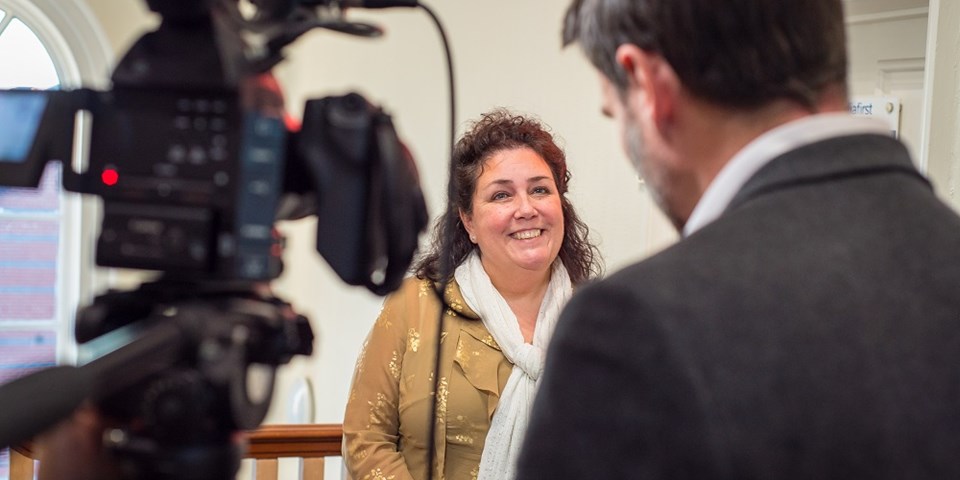It’s almost the time of year when we review the best and worst interviews of the past 12 months.
The list has been compiled (and we’ve checked it twice) ahead of our masterclass in December, which you can register for here.
And then along comes a late entry.
Step forward James Cleverly.
The new Home Secretary produced an attention-grabbing interview for all the wrong reasons when he appeared on Radio 4’s Today programme, which you can listen to here at around 2:10 for as long as the broadcaster makes it available.
The interview grew increasingly tetchy as presenter Amol Rajan explored the Government’s Rwanda policy.
And the frustrations boiled over as Mr Rajan read out passages from the Supreme Court judgement that the deportations policy was illegal.
“Are you asking questions or are you making statements?” the Cabinet minister asked.
“Because if you’re going to make a statement, I can go and get a cup of tea.”
Mr Rajan said: “No, no you’re making statements, whereas I’m asking questions.
But the politician continued, saying: “No, no you’re not asking questions, you’re making statements. I want to answer your questions.
“But you’re making statements and then moving on without giving me an opportunity to address the statements you make, a number of which I disagree with.”
Order was restored for a while, but there was another techy exchange towards the end.
When the presenter asked about a Labour party claim that he had privately described the Rwanda policy as “batsh*t”, the Home Secretary accused him of ‘falling into a trap’ set by the opposition.
Mr Rajan retorted: “You’ve fallen straight into the trap of not answering the question, having given a sermon about how you want to answer the questions.”
And the presenter had the last word, saying: “It is not about a trap, is it? It is about asking whether or not you used a particular phrase to help us understand your thinking.”
Here's how the radio interview was reported by the wider media:
'If you're just going to make a statement I can go and get a cup of tea': James Cleverly in on-air bust up with BBC's Amol Rajan in bad-tempered interview... as Home Secretary says he 'doesn't remember' privately branding Rwanda policy 'batsh**' Daily Mail
'You're making statements!' Cleverly erupts in furious on-air R4 clash with Amol Rajan Daily Express
Cleverly clashes with radio presenter over Rwanda policy during interview Independent
So, what can other media spokespeople learn from this fiery encounter?
Well, Mr Cleverly did fall into the trap of not remaining composed when faced with tough questions.
A high-profile politician like Mr Cleverly, is likely to face more tougher questions than most other spokespeople, especially when discussing a divisive policy.
But all spokespeople will face questions at times that they would rather not answer.
During our media training, we stress to delegates that you cannot afford to lose your cool.
You must remain composed.
Getting involved in an argument with the journalist doesn’t result in better coverage or your message being heard.
It causes a distraction and can damage credibility.
Think about Mr Cleverly’s interview. Do you remember any of his messages? Or the fact he threatened to walk out of the interview because he didn’t like the way it was going?
As we stress during our media training courses, preparation lies at the heart of media interview success. Mr Cleverly was only a few days into the job but he must have known he would face tough questions and that whoever he was interviewed by on the Today programme would explore the details of the judgement in forensic detail.
So, why was he not better prepared for that level of scrutiny?
Spokespeople must anticipate tricky questions and plan how to respond to them.
The final lesson is about ignoring questions.
The “batsh*t” question clearly takes Mr Cleverly to some uncomfortable territory.
But ignoring the question and criticising the reporter for falling into a trap is a dangerous approach.
It is a strategy many politicians – and other spokespeople – attempt.
But it makes them seem arrogant and out of touch.
It also irritates the journalist. Mr Rajan came straight back to the question in this interview.
And to give him some credit, Mr Cleverly answered it much better the second time around.
Is the government prepared to leave the European Convention on Human Rights in order to secure its Rwanda asylum policy?
— BBC Radio 4 Today (@BBCr4today) November 16, 2023
And did the new Home Secretary previously describe the policy as 'batshit'?@AmolRajan asks James Cleverly on #R4Today
“I don’t remember a conversation like that,” he said. “But the point I’m saying is – and I said this at the dispatch box – I listened very closely to the Labour party’s proposals. And basically, their grand idea is to do some of the things the Government is already doing, but not all the things we are proposing.”
That’s a much better answer that acknowledges and briefly answers the question before bridging to safer ground.
So, why not do that the first time around? Why put yourself in a position where the presenter calls you out for ignoring questions?
It just doesn’t seem particularly clever.
You can see more interviews like this during our December masterclass.
Some of our training team of working journalists will look back at the best and worst interviews of 2023 and the lessons others can learn from them.
Join us on 6 December by registering here.
It won’t be packed full of interviews with politicians, we promise (at least not the good examples).
Media First are media and communications training specialists with over 35 years of experience. We have a team of trainers, each with decades of experience working as journalists, presenters, communications coaches and media trainers.
Click here to find out more about our media training courses.
Subscribe here to be among the first to receive our blogs.



